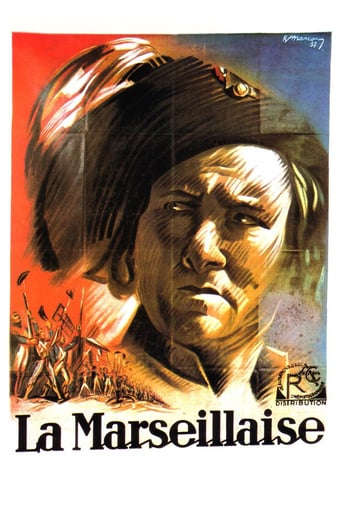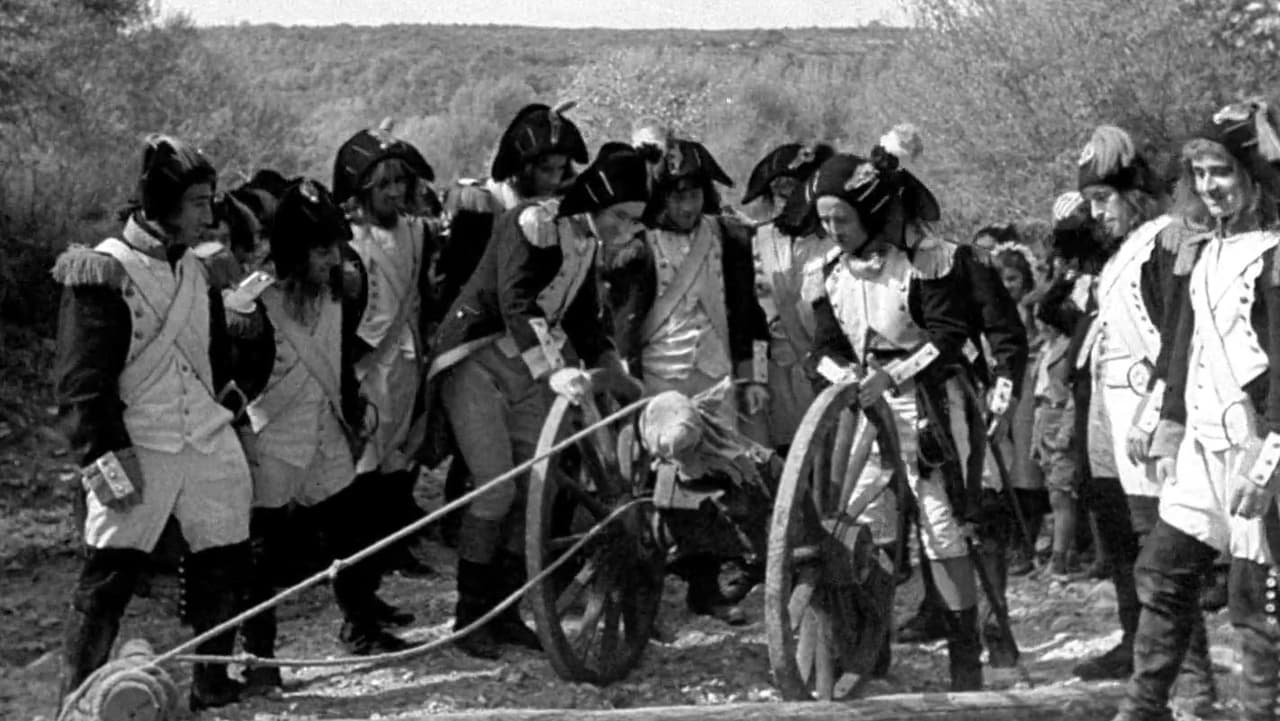LobotomousMonk
La Marseillaise depicts lesser known stories attached to the events in Versailles in 1789 which led to the downfall of the monarchy. Renoir continues with a consistent stylistic system - great depth of field, two-shot closeups, framing of crowds, mobile framing, polyvocal (accents). In fact, aristocrats and citizens receive the same treatment from the camera. The exception is with the King and Queen who receive one-shot closeups, however, this seems more in the service of a dialectic regarding the Brunswick Manifesto than it being about psychological identification. This story is symbolic and likely the symbolism and abstraction is what led to the film not being as popular as was expected. There is also a confusion for the spectator because of Renoir's humanist treatment. Bumpkins are charming, aristocrats are accepting and armies more or less fight together instead of against each other. Renoir often spoke out against violence in film and this might be another disappointment for audiences at the time. Most violence is dissuaded through crafty acts of oration. The brains over brawn theme certainly lacks something of the 'common touch'. The breaking down of the song into parceled quotations reminds of the French New Wave's often lyrical and intellectual modes of expression. There is a monarchist rhetoric that runs through the film regarding order versus anarchy... yet there is little example of anarchy but also no false reprisal by monarchists against citizens. The treatment of war is tepid, but it just goes to show that Renoir was never comfortable representing hardened political positions.
tieman64
"Change does not roll in on the wheels of inevitability, but comes through continuous struggle." - Martin Luther King Jr Like much of director Jean Renoir's work during this period, "La Marseillaise", which offers a romanticised retelling of the French Revolution of 1789, spends much of its time contrasting the lives of commoners with those of the aristocracy. Modern audiences will no doubt find this class baiting tedious, but such angry tracts were common in the lead up to, and wake of, the second world war (everyone from Renoir to John Huston to Rossellini to Pasolini to Pontecorvo etc). By the end of the 70s, cinema's fires of revolution, which Renoir lights here, and which were subsequently passed on from torch to torch for roughly four decades, would completely burn out.The film is divided into five chapters (The Court, The Civil and The Military Authorities, The Aristocrats, The Marseilles Locals, and The Ordinary Citizens), but essentially takes the structure of a grand march from Marseilles to Paris, a battalion of 500 volunteers arriving in time to capture The Tuileries Palace, leading to the publication of the Brunswick Manifesto and the overthrowing of Louis XVI's monarchy. With this march came "La Marseillaise", the song of the peasants, which later becomes France's national anthem.Renoir's direction is impeccable, the director adopting a naturalistic, semi-documentary tone. The film's well-choreographed battles and crowd scenes are particularly impressive. Today, its marriage of scope and sensitivity means "La Marseillaise" is still the best film to directly document the French Revolution. Martin Scorsese calls it "one of the finest and richest historical films ever made", and would borrow from it heavily for his stylish but strangely vapid pulp-revolutionary movie, "Gangs of New York".Renoir himself considered "La Marseillaise" one of his favourite films. Fittingly, it was partially sponsored by the Popular Front government of France (a coalition of leftists in power at the time) and was also financially backed by the French trade unions and the public.In terms of flaws, the film fails to get us to actually "care" about the revolution, has too much speechifying during its first hour (it eventually becomes quite stirring) and possess a brand of 1930s melodrama which modern audiences will no doubt turn their noses up to. Ironically, the most touching scene in the film is of a tortured King Louis XVI surrendering his power to the National Assembly. Visconti would be proud.What dates the film most, though, is the fact that we now firmly live in post-revolutionary times. Renoir rallies against aristocrats and their crimes against humanity, he champions for the revolution as a call to the rights of man, he reminds citizens to always be vigilant in defending liberty against tyranny, he advocates against both monarchy and nationalism, he demands that commoners be given an equal voice in government...bunch such things have a quaint, almost naive tinge nowadays.In our era of "diversity", "devolved power", "anticentralizen", "digitized capitalism", "mobilized local creativity and self organisation", there is simply no head to strike. Revolution is an art. It is an art of realising and "seizing the moment". Today, in which context is near impossible, in which moments and time itself seem increasingly fleeting, in which "culture" is one of continuous flux (or rather, the continuous rapid movement of commodities, which creates the illusion of change, of progress) and perpetual confusion, traditional revolution, as Renoir sees here, seems impossible. This is what another French director, Robert Bresson, realised with "The Devil, Possibly", and what Godard spends his career wrestling with.8/10 – Worth one viewing.
Jay Raskin
Given the monumental importance of the French Revolution in history, it is surprising that so few films have been made about it or have even used it as a setting. "The Assassination of the Jean Paul Marat" is probably the most interesting and offbeat film, but it takes place 20 years after the revolution and only debates and argues about it. "Scarlet Pimpernel," "Reign of Terror," and "Tale of Two Cities" just use the revolution as backdrops to tell fun adventure stories. "Danton" is boring, anti-revolutionary and childish, everyone is presented in black and white terms. Griffith's "Orphans of the Storm" has lots of delights and some great action sequences, but is too didactic and anti-revolutionary. "Marie Antonette" (2006) and "Affair of the Necklace" are beautiful and great works, but show little interest in the revolution itself.Although it deals with only some events leading to the overthrow of the monarchy, "La Marseillaise" is possibly the best film. It shows the complexity of the events and deals with them in an intelligent and reasonable manner. It shows how "the Brunswick Manifesto" led to the arrest of the King and Queen. While Marie and Louis, are not shown in a particularly good light, neither are they caricatured.The movie is episodic and slow, but there are a number of dazzling shots and scenes. The attack on the King's palace at the end is the dramatic highlight. There is a fabulous scene in the middle of the film where the aristocrats are singing a song about how they are going to "hang the traitors" and shortly the revolutionaries answer by singing about how they are going to "hang the aristocrats." It shows the most humanistic, balanced and honest presentation of the situation of any film on the subject that I have seen.
Dr. Barry Worthington (shrbw)
This film, despite being directed by Renoir, is largely forgotten today. This is a pity, as there are few films actually about the French Revolution (though it is used as a backdrop for a variety of plot lines), and none that really deal with the birth of the Republic.It was made at the tail end of the 'Popular Front' government, a coalition of parties (including the communists) formed to protect the Third Republic from right-wing domestic subversion and the baleful influence of the Nazis.It chose to use the early years of the revolution as a metaphor for this political situation - France was still a (constitutional) monarchy, and the King possessed the power of a constitutional veto. The Queen and her circle were said to be plotting a counter revolution.Within this context, each city and region of France is requested to send a Battalion to Paris, to defend the government against its domestic enemies. We follow the adventures of some of the ordinary men in the battalion from Marseilles (who sing a new song called the "Marseilles" as they march. We see their experiences in Paris (including a love interest), and their simple and honest defence of what they believe in. Finally, they participate in the coup that leads to the establishment of the Republic and the arrest of the King.The film is episodic, and some of the scenes are a little melodramatic. But the characterisation is excellent. The King and his court are not one-dimensional villains. The scene of his departure is quite moving.In short, a film well worth rescuing from obscurity.


 AD
AD


